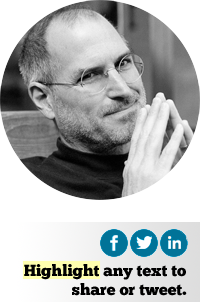Topics: Life Before Apple | How He Saw Himself | Building Apple | Macintosh Memories | Returning to Apple | Leadership Style | The Apple Difference | Apple Products | Design | Creativity & Innovation | Technology | Recruiting | Microsoft | Other Companies | Money | Philosophy & Beliefs | Predicting the Future | Personal Stuff | Death | Lessons Learned
 Steve Jobs Quotes: Technology
Steve Jobs Quotes: Technology
It had nothing to do with using [programs] for practical things, it had more to do with using them as a mirror of your thought process. To actually learn how to think. I think everyone in this country should learn to program a computer. Everyone should learn a computer language because it teaches you how to think. I think of computer science as a liberal art.
These technologies can make life easier, can let us touch people we might not otherwise. You may have a child with a birth defect and be able to get in touch with other parents and support groups, get medical information, the latest experimental drugs. These things can profoundly influence life. I’m not downplaying that. But it’s a disservice to constantly put things in this radical new light — that it’s going to change everything. Things don’t have to change the world to be important.
We think basically you watch television to turn your brain off, and you work on your computer when you want to turn your brain on.
Who wants a stylus. You have to get ’em [out] and put ’em away, and you lose ’em. Yuck. Nobody wants a stylus.
When you’re young, you look at television and think there’s a conspiracy. The networks have conspired to dumb us down. But when you get a little older, you realize that’s not true. The networks are in business to give people exactly what they want.
It took us three years to build the NeXT computer. If we’d given customers what they said they wanted, we’d have built a computer they’d have been happy with a year after we spoke to them — not something they’d want now. [1989]
The over-all point is that new technology will not necessarily replace old technology, but it will date it. By definition. Eventually, it will replace it. But it’s like people who had black-and-white TVs when color came out. They eventually decided whether or not the new technology was worth the investment.
We don’t believe it’s possible to protect digital content… What’s new is this amazingly efficient distribution system for stolen property called the Internet — and no one’s gonna shut down the Internet. And it only takes one stolen copy to be on the Internet. And the way we expressed it to them is: Pick one lock — open every door. It only takes one person to pick a lock. Worst case: Somebody just takes the analog outputs of their CD player and rerecords it — puts it on the Internet. You’ll never stop that. So what you have to do is compete with it.
People know how to deal with a desktop intuitively. If you walk into an office, there are papers on the desk. The one on the top is the most important. People know how to switch priority. Part of the reason we model our computers on metaphors like the desktop is that we can leverage this experience people already have.
Software is the user experience. As the iPod and iTunes prove, it has become the driving technology not just of computers but of consumer electronics.
There is a lot to be said for comparing [going from mainframes to the PC] to going from… passenger trains to automobiles. And the advent of the automobile gave us a personal freedom of transportation. In the same way the advent of the computer gave us the ability to start to use computers without having to convince other people that we needed to use computers. And the biggest effect of the personal computer revolution has been to allow millions and millions of people to experience computers themselves decades before they ever would have in the old paradigm. And to allow them to participate in the making of choices and controlling their own destiny using these tools.
I think it’s brought the world a lot closer together, and will continue to do that. There are downsides to everything; there are unintended consequences to everything. The most corrosive piece of technology that I’ve ever seen is called television — but then again, television at its best is magnificent.



